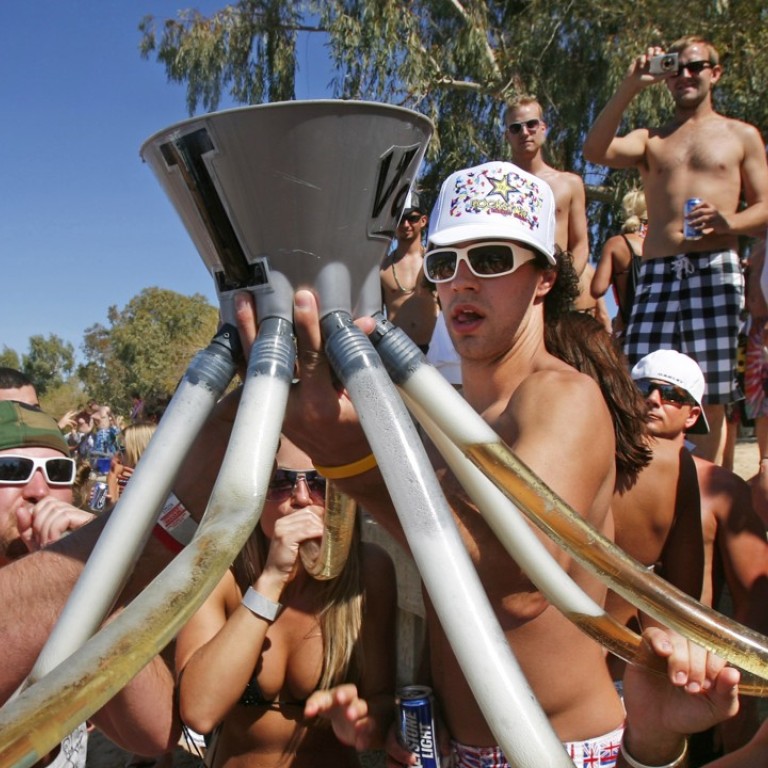
Mobile app vs binge drinking culture: Australian university students say they would ignore nagging messaging service
A newly launched phone app will send users questions such as, “What time do you intend on going home?”
A government-developed app that texts reminders to university students to stop drinking will largely be ineffective, students say.
The A$300,000 (HK$1.78 million) app designed by VicHealth aims to curb binge drinking among university-age Australians, but has been likened to a nagging “cyberparent”.
Users will activate the app before they embark on a night out, and the app will ask questions such as, “Do you have work tomorrow?” or “What time do you intend on going home?”
Students will also be asked to complete periodic surveys about how they are feeling, how much money they have spent, and how inebriated they feel.
The app will keep sending text messages during the night.
The app’s designer, Dr Megan Lim, told Australian media the app would help students establish healthier drinking habits, and give them the tools to better manage their drinking.
“This system isn’t telling people not to drink, but this is providing an option for them to manage their own drinking, or pace their drinking or make sure [they] don’t drink and drive,” she said.
As soon as I was encouraged to continue what I’m doing, then I wouldn’t pay any attention to what an SMS was telling me
“Research from New Zealand shows that [binge drinking in] O-week ... sets them up for the rest of the year in terms of their drinking habits.”
But a La Trobe University law student, Eadie Allen, said students would simply ignore the reminders.
“Personally, when I go out drinking, I put my phone away and don’t look at my phone at all, particularly with an app or an SMS service,” she said.
Allen believed the social culture around drinking at university was more powerful than any reminders the app could produce.
“I would look at it and maybe have a second to think about what I’m doing,” she said. “But as soon as I was encouraged by everyone around me to continue what I’m doing, then I wouldn’t pay any attention to what an SMS was telling me.”
Harry Gregg, a welfare officer at the University of Sydney students’ representative council, wanted to see the programme also target broader issues associated with problem drinking.
“It’s very important to remember the root causes of problem drinking, and how things like mental health are a driver for people to drink, and also an effect,” he said.
“This app could be really effective if trialled with other things, like consent training in universities.
“We would like a government programme to solve those issues and this app doesn’t solve those issues.”
However, he said it was “a step in the right direction” and could be effective.
“It’s very important to teach young people about their limits,” he said. “A lot of young people find their limits the hard way and that’s what we definitely shouldn’t encourage.
“I think the app will partly work. This might be anecdotal, but to have a reminder there is really important. It’s better than nothing.”
The app will begin trials in 2018 and was announced on Wednesday as part of a A$1 million bundle of programmes by VicHealth to reduce risky drinking behaviours.
Other campaigns include a Gen X and baby boomer-focused peer support programme for heavy drinkers in regional areas, a programme targeting construction workers, and a campaign led by the Victorian AIDS council looking at drinking among LGBT women in regional areas.
In June, VicHealth also granted $75,000 to five local city councils for youth-based programmes as part of their three-year Alcohol Culture Change Initiative.
VicHealth’s website has a database of more than 300 third-party healthy living apps that it rates and evaluates.
These include I Am Sober, which tracks how long users have been sober, Alcohol Cutdown Coach, a motivational drinking tracker, and weight-loss app Applause.
However, none of the rated apps had over a three-star rating from VicHealth.
In 2016 the director of the Australian Human Rights Centre told university vice-chancellors that student drinking culture played a role in sexual assaults, along with broader gender inequality.
Among younger Australians, a 2016 national drug survey found fewer teenagers were drinking alcohol compared with 2013, with the figure dropping from 28 per cent to 18 per cent.

